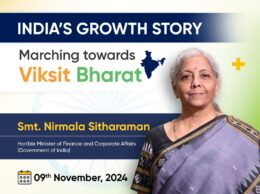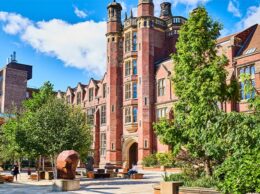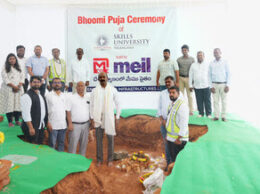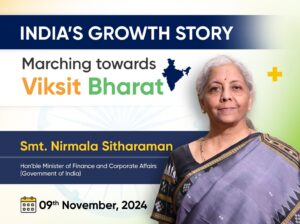VARANASI : India was a global soft power since ancient times and we are on our way to reclaim that status, said celebrated author and Director, The Nehru Centre, London, Mr. Amish Tripathi, as he shared his thoughts on “The Rise of Modern India” during an interaction with students of Banaras Hindu University. The interaction program organized by the Department of Philosophy and Religion, Faculty of Arts, and Malaviya Muoolya Anusheelan Kendra as part of Kashi Tamil Sangamam, saw students and faculty members in large numbers attending the session. The IIM (Kolkata)-educated banker-turned-author started by talking about his Varanasi and BHU connection and shared that his grandfather was a faculty member in the varsity while his father studied here.
Mr. Tripathi said that India’s growth surpassed the United Kingdom this year and what India lost in 150 years in terms of GDP has been gained back in the last 30 years. He exuded confidence that what India has lost in the past 900 years will be earned back in the next 25 years. Citing economists, Mr. Tripathi said that India’s per capita income will become higher than that of Europe’s, like it was nine centuries ago. He said that we are poised to become the Vishwaguru, but the question is what kind of nation we want to be when we reclaim that position. “We come from a tradition where we don’t attack others so we won’t act like a super power but the Vishwaguru”, said Mr. Tripathi. He said today’s youth are born in a golden era as they will be witnessing the rise of India, hence they have a bigger responsibility of shaping the country’s future. Talking about the legacy Indians come from, he reiterated the need of understanding India’s ancient roots and heritage. He said that for decades we were told that India wasn’t a nation and was crafted as one by our colonial rulers, which was incorrect in every way. Citing ancient Indian texts, Mr. Tripathi said our ancestors created India and a strong one which despite being subjected to frequent attacks by external forces, still stands strong and proud. “We were always a rich civilization and culturally strong nation, full of diversity, but one and united and Kashi Tamil Sangamam is a celebration of that.”
He questioned as to why many great Indian heroes of India never found a mention in history books. “We see no mention of Raja Suheldeo. There is a very limited mention of Cholas. There are many more stories which have been left out while writing history books”, said Mr. Tripathi highlighting the ever greater need to know and celebrate the great stories of Indian history.
He said that we had great trading kingdoms across India in the past and through trade we took our culture and soft power to the globe, unlike others who attacked and used the military to conquer. Stressing on confidently furthering India’s trade ties internationally, Mr. Tripathi said that as we trade more we will grow and expand more. We were very proud and rooted in our culture. He said as we move forward in our quest to become a world power, we must follow three key lessons from our ancestors: defend ourselves strongly, trade confidently and grow our economy and third keep learning from good things wherever they come from.
The writer also had an engrossing interactive session with the students, where he was received by diverse questions encompassing literature, religion and science. While answering them, he emphasized on the need to maintain a balance between pursuing passion and being practical in one’s quest to follow the dream career as well as his role more as a chronicler than a creator. Knowledge is the greatest disinfectant, said Mr. Tripathi as he advised students to read more and diverse things in order to have a deeper sense of a subject. He said in ancient India science and knowledge were not in conflict and both progressed on the similar basis, which was “to question” or “finding answers”.
The audience also had the opportunity to witness the pilgrimage of Tripathi in the realm of words via the screening of a short film. Prof. Anand Mishra, Head, Department of Philosophy and Religion, in his welcome note, lauded the writer’s ethno-progressive thematics, in his works. The session concluded with a vote of thanks by Prof. Sanjay Kumar, Coordinator, Malaviya Moolya Anusheelan Kendra, who, harking back to Tripathi’s argument said the whole ‘concept’ of ‘Nation’ is a European construct and as a country that has celebrated diversity since time immemorial, India has to look for its own framework.
Dr. Dhriti Ray Dalai conducted the program and moderated the question and answer session. The Mangalacharan stotra was performed by Prof. Patanjali Mishra. Sumedha, Shreya and Alka, students of Faculty of Performing Arts presented the rendition of the BHU Kulgeet. Prof. Krishna Mohan Pandey, Head, Department of English, Dr. Usha Tripathi, Prof. Kamal Sheel, Dr. Panchanan Dalai, Dr. Rahul Chaturvedi were among those present during the program.









